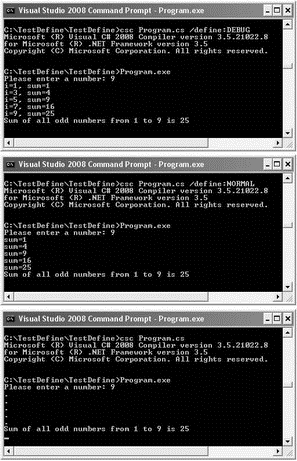Книга: C# 2008 Programmer
#if, #else, #elif, and #endif
#if, #else, #elif, and #endif
As you saw in the preceding section, the #if and #endif preprocessor directives defines a block of code to include for compilation if a specified symbol is defined. You can also use the #else and #elif preprocessor directives to create compound conditional directives.
Using the previous example, you can add the #else and #elif preprocessor directives as follows:
using System;
using System.Collections.Generic;
using System.Linq;
using System.Text;
namespace TestDefine {
class Program {
static void Main(string[] args) {
Console.Write("Please enter a number: ");
int num = int.Parse(Console.ReadLine());
int sum = 0;
for (int i = 1; i <= num; i++) {
//---sum up all odd numbers---
if (i % 2 == 1) {
sum += i;
#if DEBUG
Console.WriteLine("i={0}, sum={1}", i, sum);
#elif NORMAL
Console.WriteLine("sum={0}", sum);
#else
Console.WriteLine(".");
#endif
}
}
Console.WriteLine(
"Sum of all odd numbers from 1 to {0} is {1}",
num, sum);
Console.ReadLine();
}
}
}
Figure 3-15 shows the different output when different symbols are defined. The top screen shows the output when the DEBUG symbol is defined. The middle screen shows the output when the NORMAL symbol is defined. The bottom screen shows the output when no symbol is defined.

Figure 3-15
The #if preprocessor directive can also test for multiple conditions using the logical operators. Here are some examples:
#if (DEBUG || NORMAL) //---either DEBUG or NORMAL is defined---
#if (DEBUG && NORMAL) //---both DEBUG and NORMAL are defined---
#if (!DEBUG && NORMAL) //---DEBUG is not defined AND NORMAL is defined---
- Разработка приложений баз данных InterBase на Borland Delphi
- Open Source Insight and Discussion
- Introduction to Microprocessors and Microcontrollers
- Chapter 6. Traversing of tables and chains
- Chapter 8. Saving and restoring large rule-sets
- Chapter 11. Iptables targets and jumps
- Chapter 5 Installing and Configuring VirtualCenter 2.0
- Chapter 16. Commercial products based on Linux, iptables and netfilter
- Appendix A. Detailed explanations of special commands
- Appendix B. Common problems and questions
- Appendix E. Other resources and links
- IP filtering terms and expressions




